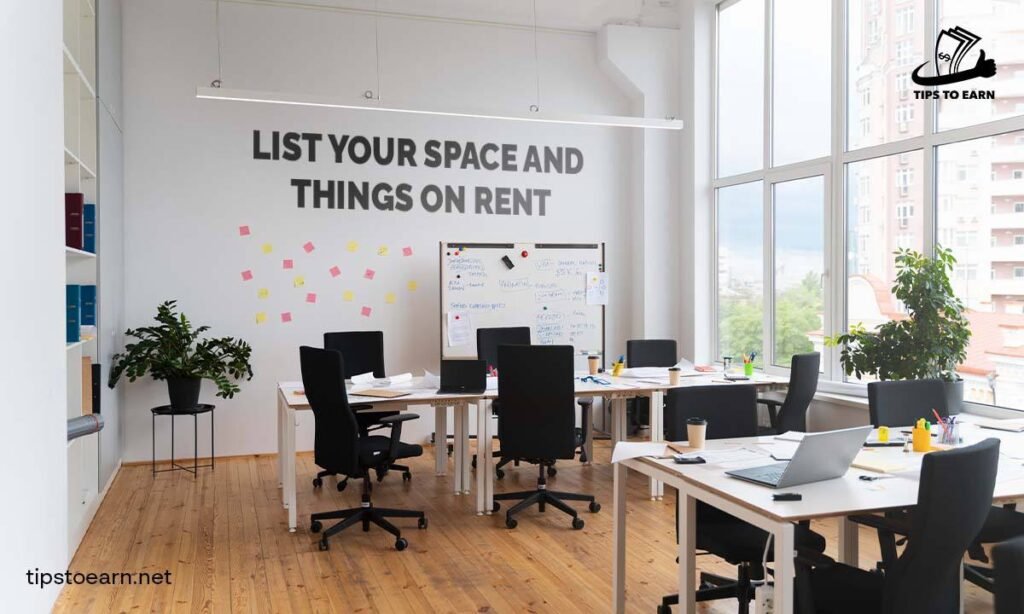Choosing to rent a space for your company is a major choice. List your space and things on rent, Selecting a location that is affordable, appealing to your staff and customers, and appropriate for your kind of business is crucial.
You can employ specific techniques to make sure you locate a location that is ideal for your company when you are renting a business space.
We provide you with 21 suggestions in this article on how to rent space for a business.
Top 21 Tips To List Your Space And Things On Rent With Ease

Because of the costs, a lot of businesses decide to rent space instead of buying a location.
For instance, renting a small office space is frequently far less expensive than purchasing the entire building.
Furthermore, a business’s space needs could alter as it evolves.
It’s simpler to move about as needed when you rent a space.
The following are the 21 best tips you need to follow if you want to list your space and things on rent:
1. Assess If You Require A Space
Determine whether you need office space before you rent a space.
These days, some companies can run remotely. This implies that every employee uses the Internet for communication and works from home.
You can do away with the expenses of leasing a space if your company can function in this manner.
2. Make A List Of Essentials
Make a list of the features you want in the space you move into before you visit any possible locations.
For instance, you might need a room with a specific amount of restrooms, a waiting area, or a kitchen.
You can save time and reduce the number of locations you look into further by determining what features your space must have.
3. Select A Neighboring Location
Think about your own and your employees’ commute times. To ensure that no one has to travel too far for work, try to find a location that is convenient for everyone.
Perhaps all you need to think about when starting a new business is where it will be located.
Shorter commutes lead to happier employees, so having a close location is a benefit of renting any type of business space.
4. Look Around The Area
Make sure you want to live in the neighborhood by taking the time to learn more about it before renting the space.
For instance, you might want a location where you can take clients or where staff members can go after work and find nearby local restaurants.
Furthermore, you want visitors to your location to feel secure in the neighborhood.
5. Determine How Much Room You’ll Need
One of the most crucial elements is the space’s size. It is ideal to have a room that is just large enough to accommodate you and your group without being overly spacious.
Since the amount of square footage you rent determines a large portion of the rental price, having too much space can be a waste of money.
Consider how many rooms you’ll need in your area or make an approximation of the square footage you’ll need.
6. Give It Space To Grow
Allowing yourself some room to grow can be a wise decision when determining how much space you need.
To avoid having to relocate again, you should make sure that your office can accommodate all of the additional staff members you plan to hire shortly.
Seeking a space that is slightly larger than you require will help you expand without feeling cramped.
7. Find Out More About The Structure
If I say List your space and things on rent then you have to take some time to familiarize yourself with the building that houses the rental space.
Find out about the building’s age, how you’ll access your space, and whether other businesses are housed there.
Finding out more information about the building can be beneficial even if your space takes up the entire building, as it will aid in your decision-making.
An older building might not have the same heating and air conditioning system as a newer one.
8. Opt For A Safe Structure
It’s critical that when you’re not working, your office stays secure.
Learn about the security measures in place to keep your rental property safe.
For instance, the building might have alarm systems on each door and security cameras all over the property.
Verify that the security measures are robust enough for you to feel at ease leaving your important equipment there.
9. Learn To Know Your Neighbors
You can find out more information about the area by having a conversation with the rental space’s neighbors.
They can share with you their knowledge of the building and your area.
They can offer feedback on the building’s condition or the landlord’s character if they share the same building.
Additionally, you can learn about the type of environment you’ll be working in by getting to know your neighbors.
10. Look Into The Landlord
Throughout your time as a renter, you will communicate with the landlord frequently.
Thus, it’s a good idea to work with a reputable, personable, and professional landlord.
Your first encounters with them will teach you some of this, but you can also do more research on them.
Make sure there are no unfavorable reviews by doing some internet research on the landlord.
11. Choose A Layout That Complements Your Style
Structures will provide a variety of layout choices.
For instance, some areas might have multiple tiny offices, whereas others might have an open floor plan.
Select a location for your business based on the style you have in mind for it.
12. Consider Parking And Public Transportation
For both your team and your clients, parking, and transportation are crucial components.
A convenient parking area is required for anyone driving to your location.
Investigate the local public transportation options as well.
For instance, you can find the distance between you and the nearest bus or subway stop if you’re in a city.
13. Establish A Strict Spending Plan
The purpose of list your space and things on rent is to set a budget before you visit any possible locations.
Knowing the most you can afford to pay for rental space is a smart idea.
In this manner, you won’t choose anything that is beyond your means when you are looking around possible locations.
14. Think About Your Timeline
Determine the length of time you want to lease a space.
Consider if you need something now or if it will be necessary in the future years, even if you only intend to stay for a few months.
You can make sure you get the right length of lease from the landlord by letting them know how long you plan to stay at the place you find.
15. Recognize The Things You Can Customize
The majority of entrepreneurs wish to alter the spaces they lease in some way.
Discuss with the landlord the modifications you are and are not permitted to make. To better represent your brand, you might want to paint the walls a different color.
The landlord might consent to this, but he might not allow walls to be taken down to create an open-concept layout.
Understand the restrictions so you can determine whether the space can be sufficiently customized to your preferences.
16. Learn What Kind Of Condition The Space Will Be Given To You
When you get the place, find out if it needs any cleaning, repairs, or general upkeep.
It’s not ideal to move in thinking the landlord will take care of certain things only to find out later that you have to take care of them yourself.
To ensure clarity for both parties, talk with the landlord about particular issues.
17. Consider Additional Expenses
When examining a rental space, costs should be taken into account besides rent.
Ask about any additional expenses, such as utilities, that are not covered by the rent.
Getting an estimate for these expenses is a good idea, and you should account for them in your budget.
18. Pick A Location That Seems Appealing
Think about how attractive the area appears from the outside.
A person’s appearance matters if you plan to invite customers or clients into your space.
A well-presented external façade enhances the establishment’s credibility with clients and staff.
19. Obtain More Perspectives
Think about getting advice from others while looking for a rental.
For instance, invite a few more team members to attend and solicit their opinions.
You can also ask friends or family for advice if you bring them along.
They might raise issues that you missed or offer you insightful questions to put to the landlord.
20. Engage In Real Estate Work
Partnering with a reputable realtor is an excellent choice for the duration of this process.
A competent realtor carefully chooses locations that might meet your needs after discussing them with you.
They’ll also be more knowledgeable about reputable landlords and desirable neighborhoods to work in.
Lastly, before you sign anything, have a realtor review the lease agreement as they have experience with them.
21. Examine The Lease Thoroughly
Whether you use a realtor or not, it’s crucial to carefully read the lease before signing.
Make sure that everything you agreed to is in writing and that there are no clauses in the lease that you were unaware of.
Before signing, bring up any concerns with the landlord once more.
Related Content: 21 Ways To Make Money Online
Final Words
Listing your space on rent as well as furniture and other things could be very profitable.
It is quite like renting a homestay. However, there are times when businesses might get off track.
There are instances where you might have to break your lease early. Find out what the consequences are for leaving early.
Should these be excessively stringent, you might want to look into a place with less strict exit procedures.
In any case, it’s a good idea to be aware of the possible consequences in advance so you can account for them when deciding whether or not to leave early or even list your space and things on rent in the very first place.
You May Like Also:




Pingback: 21 Ways To Make Money Online In 2024 - Tips To Earn
Pingback: Start Online Reselling: 21 Best Ideas To Vouch For This Year
Pingback: Set Up An Ecommerce Business: 21 Marketing Strategies